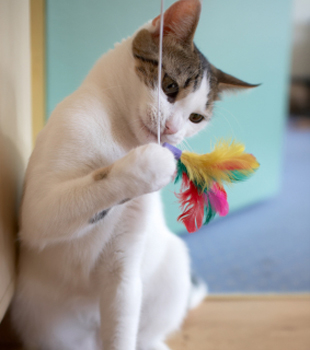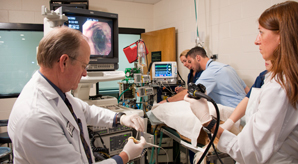Small Animal Internal Medicine

Make an Appointment
To make an appointment with Small Animal Internal Medicine please call (970) 297-5000.
Veterinarians wishing to make a referral can view our rDVM page for more information.
What to Expect at Your Appointment
Our goal is to offer you comprehensive veterinary medical care while providing instruction for our veterinary students, interns, and residents. Although the time you spend with us might be a bit longer than visiting a regular veterinary hospital, your pet will be seen by a veterinary team with a great amount of collective knowledge and expertise.
Most patients can expect the following when arriving for their appointment.
(Endoscopy patients and I-131 patients may have additional considerations.)
Note: For the majority of our appointments it is helpful to fast your pet beforehand (water is OK, but no food after 10pm the night before your appointment). Talk to a veterinarian about the appropriate way to fast your pet, especially if they are on medciations or are diabetic.
- Please your pet's medical records to your appointment, particularly medication and imaging records.
- You will be greeted by one of our fourth-year veterinary students.
- This student will perform an initial exam and discuss your pet's medical history with you.
- The student will then leave the room to briefly discuss their findings with the veterinarian.
- A veterinarian will then perform their own examination, and clarify important aspects of your pet's medical history in addition to reviewing what the student has found.
- The veterinarian will discuss a diagnostic plan with you and provide you with a fee estimate. The veterinarian will work with you to make decisions about diagnostic tests and treatments for your pet.
- Many (but not all) diagnostic tests can be performed the same day, in which case you'll be asked to leave your pet and either wait at the VTH or arrange for communication later that day. When they are available, the veterinarian and student will discuss the initial diagnostic results and propose any further diagnostics or therapeutic plans for your pet.
- Any agreed upon special diagnostic tests or procedures are then scheduled.
- In most cases your pet will be discharged the same day, although the results of some diagnostic tests may require additional time for completion. In more complicated cases or for more involved diagnostic procedures, you may be asked to leave your pet at the VTH overnight, or return your pet the following morning.
- In cases where your pet needs timely or significant therapeutic intervention (for example, intravenous fluids or medications, oxygen, advanced monitoring), your veterinarian will share this with you and discuss the various options available at the VTH (e.g. treatment in the Internal Medicine wards or admittance to Critical Care.).
- Upon completion of your pet's work-up at the VTH, you should receive both oral and written discharge instructions (the written version may be delayed for a short period of time by pending test results).
- If you have been referred to the VTH by another veterinarian, he or she will be notified of the results of your appointment.
- You may well have a follow-up recheck appointment(s) or phone consultations so that we may keep track of your pet's progress.
Endoscopy patients:
- The majority of endoscopic procedures are done the day after your pet's initial appointment where it is determined that endoscopy is the best diagnostic procedure.
- Some endoscopic procedures (e.g. colonoscopy), may require several days of preparation. Every case is unique, so you should speak to your veterinarian about how to properly prepare your pet for a successful procedure.
- Once scheduled, most endoscopic procedures are done on an outpatient basis and always under general anesthesia.
- Generally, your pet will arrive at the hospital in the morning and be ready to go home in the afternoon, once your pet has recovered from anesthesia.
- Although the results of this procedure often take several days to compile, your veterinarian and student will make sure you have discharge instructions for at-home care in the interim.
Although there are always risks inherent with anesthesia and medical procedures, your pet will have the benefit of state-of-the-art equipment and board-certified specialists in internal medicine and anesthesiology. Rest assured, these procedures are done routinely here at the CSU VTH and your pet will receive the absolute best care available.
I-131 patients:
If interested, be sure and discuss I-131 treatment with your regular veterinarian as an option for your hyperthyroid pet. Your veterinarian will share with you the risks, benefits, and requirements of this treatment.
If you and your veterinarian decide that I-131 treatment is right for your pet:
- Schedule your initial I-131 appointment with the Small Animal Internal Medicine service - be sure to let the receptionist know that your appointment is for I-131 treatment.
- Bring all the records and test results (especially the recent blood work, such as a CBC, biochemical profile, total T4 level, and urinalysis) from your veteriarian's work-up with you.
Note: You should also bring the results of what is known as a "Tapazole challenge" - you can discuss the details with your veterinarian.
- Eliminate fish from your pet's diet 14 days before your I-131 treatment appointment (including fish, shellfish, seafood, seaweed, or seaweed supplements). Be sure to read the ingredients on your pet's food.
- Your pet will be admitted to the CSU VTH for a minimum of three nights. Bring three to five days of your pet's food with you to the appointment, as well as a towel or T-shirt with your scent on it to comfort and remind your pet of home. This should be an item you are willing to part with, because it cannot be returned to you.
- On Day One of the treatment, we will perform a nuclear medicine test, thoracic X-rays, and, if necessary, a cardiology workup.
- On Day Two of the treatment, we will administer the iodine treatment.
- You will receive daily phone updates from a veterinary student about the status and treatment of your pet.
- Special care and consideration will need to be given to your pet and your home after treatment. View our Feline Post-I-131 Treatment Instructions and Canine Post-I-131 Treatment Instructions for more information.
For additional information about I-131 treatment preparation, see our Feline I-131 Treatment Checklist, Feline I-131 Treatment Information as well as a more thorough description of the I-131 Procedure.
If you do not have a regular veterinarian but you suspect your pet is hyperthyroid, simply make an appointment with our Small Animal Internal Medicine service to begin the diagnostic process.


